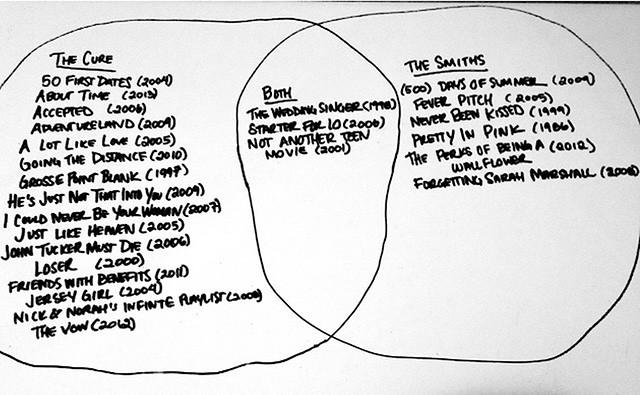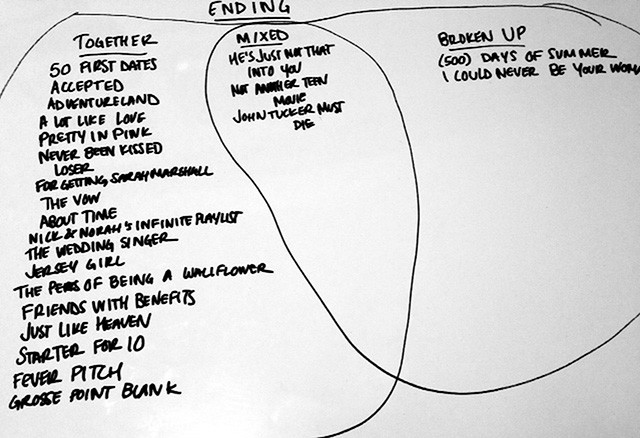Why Do So Many Romcoms Use Songs By The Cure?
Why Do So Many Romcoms Use Songs By The Cure?
by Kristina Monllos
Have you ever wondered why The Cure is used to soundtrack so many romantic comedies? Have you ever stopped to think about what that implies, that this British deep-goth turned pop-rock band hits a particular sweet spot, like the meet-cute, for this dying movie genre? A few months ago, I went to go see About Time, a middling romcom by the same writer and director of Love Actually, and when I heard “Friday I’m in Love,” something in me snapped.
I couldn’t enjoy the montage. It was Rachel McAdams and a surprisingly alluring ginger man (Domhnall Gleeson) running around, changing from chic outfit to chic outfit, falling in love! But nope. Nothing. I’m no grinch. I have a soul. I can feel things. And most of the time, even though the genre has gone downhill (or Domhnall!), I love a good romcom. I love the ridiculous ways that people get together, the over-the-top gestures that would make a real person seem insane if they did them. I even love the fatuous feats they face to really be together.
But, hearing that song again, I was annoyed, and couldn’t help but think, really!?! This was the best you could do? By now, that’s a song usage that feels too right, too expected, too done. I couldn’t respect it. Of course, this floundering genre recycles the same storylines and tends to focus on white affluent couples and just how wacky a life of privilege can get when love is thwarted, but that’s besides the point and also a totally cuckoo rabbit hole that we shouldn’t go down. The audacity of the music recycling is what pissed me off (the audacity of the other and way more problematic stuff pisses me off too, but let’s talk about that another time). Do they — they being the movie industry puppeteers, natch — really think we don’t notice this pattern? And are they now trying to use songs by The Cure to condition us to have particular emotional responses to new romcoms based on past romcoms we’ve seen, even if the ones we’re seeing have progressively poorer writing and acting? Is Robert Smith involved? Could he even be behind it?
According to IMDb, one or more of The Cure’s songs has been featured in 19 films in the genre, of their 84 soundtrack credits — all since 1997, which was the band’s 21st year.
For good measure, I considered an equivalent British band, The Smiths. Since 1986, one or more of The Smith’s songs have appeared in just nine romcoms. Oh, and yes, they do overlap. In three movies, both of the bands are used. (See terrible diagram below; do note one of them is a parody but still hews to the conventions.)

When I considered the romcoms that use The Cure, more questions popped up: why are so many movies from the early 00s using songs from the 80s and early 90s? Does this say more about the writer/director/editor than the audience? Age-wise, according to IMDb data, the minds behind the romcoms sampled tend to be in the 30s to 60s range, which makes sense.
Of the 25 films sampled, 21 were directed by men and four were directed by women. As for the writing, 18 were written by men, three were written by women and four were written by men and women.
The movie industry is dominated by men. This is an unfortunate fact, but it’s a fact. Putting together the data I’d gathered, I found myself thinking of another cliche: the white male music nerd. Remember how Joseph Gordon Levitt’s character in (500) Days of Summer geeks out because Zooey Deschanel’s Summer sang along with The Smiths song he was rudely blasting from his oversized headphones in their shared elevator space?
Sure, (500) Days of Summer was about showing how wrong JGL’s nerd was in his expectations for his relationship with Summer. So then I wondered: who are we rooting for in romcoms? Have we been following the romcom’s music nerd all along?

There were certainly more male protagonists in this data bunch than female protagonists. But, looking over the films listed, the male characters aren’t necessarily all music nerds. (The Perks of Being a Wallflower, with the best soundtrack of them all, does feature the male protagonist becoming a music nerd, but that’s alright.) Almost all of the boys and men involved would be defined as nerds in some form or another (Jimmy Fallon’s Red Sox obsession in Fever Pitch, Jesse Eisenberg basically being himself in Adventureland).
Identifying the protagonist certainly helped point us in some direction regarding soundtracks, but it didn’t quite answer the question. We weren’t watching some variation of High Fidelity over and over again.
So what about… the endings? Could it be that using “Just Like Heaven” or “Pictures of You” or “Close to Me” or “In Between Days” or “Boys Don’t Cry “ or even “Love Song” (the movie industry sure does use a variety of songs by The Cure) points to a happy ending for the film’s lovebirds?

As with the larger sample of all romcoms, a vast majority of Cure-inflected romcoms end with our couple together. (Plus, (500) Days of Summer shouldn’t even count.) So maybe that’s it. Maybe a song by The Cure has become a marker that, even though we may cry a bit, we’ll leave the theater feeling all warm and hopeful. But which came first in this jumble of correlation and causation? What if The Cure, through repeated exposure to romcom plots, has come to symbolize such fuzziness? In either event, if both The Cure and romcoms themselves are engaged in a fight against cynicism, well, I might just be okay with that.
Kristina Monllos is a Rhode Island-bred, Brooklyn-based feminist and writer who has an unabashed love for romcoms and her dog.
